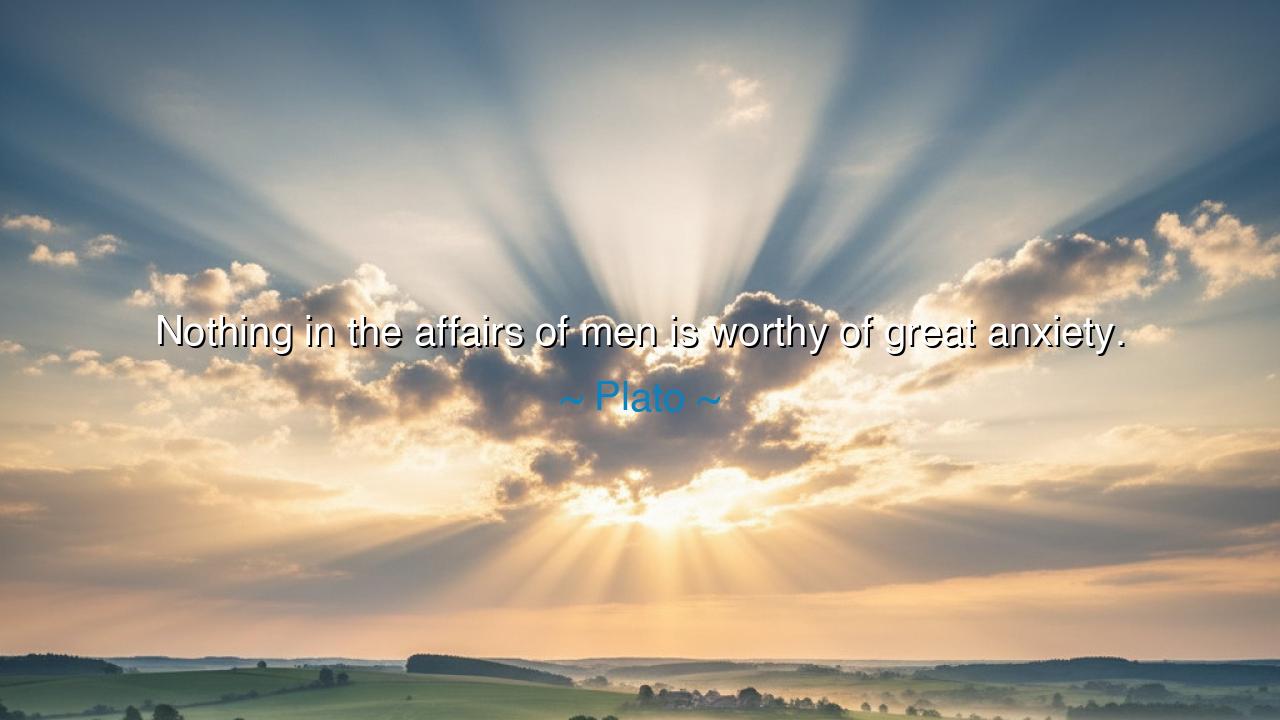
Nothing in the affairs of men is worthy of great anxiety.






“Nothing in the affairs of men is worthy of great anxiety.” — so taught Plato, the philosopher of Athens, whose wisdom endures like marble untouched by time. In this single sentence lies the still heart of all philosophy: that peace of mind is greater than the turbulence of worldly things. Plato, disciple of Socrates and teacher of Aristotle, saw through the noise of human striving and declared that the external world — with all its riches, honors, and fears — is fleeting. The only reality that endures is the soul’s harmony with truth, and thus, nothing in human affairs — not fortune nor fame, not victory nor loss — is worth the torment of anxiety.
To understand these words, one must see them as born from the soil of ancient Greece, where politics, war, and ambition ruled men’s hearts. Plato lived through the fall of Athens, through betrayal, tyranny, and the execution of his beloved teacher Socrates. He saw the madness of crowds, the fragility of governments, the vanity of philosophers who sought power rather than wisdom. In all this chaos, he discerned a single truth: that to tie one’s peace to the affairs of men is to tie it to smoke and shadow. The wise must look beyond — to the eternal, the unchanging, the divine order that exists above the storms of time.
Anxiety, to Plato, was a sickness of the soul — a confusion born of mistaking what is temporary for what is real. He taught that the world of men is full of illusions: praise and blame, wealth and loss, pleasure and pain. Those who chase them become prisoners of their own desire. But those who learn to see through them — who anchor themselves in the eternal truth — become free. They may live in the world, but they are not ruled by it. Their calm is not indifference, but understanding: a serene acceptance of the way things must unfold, coupled with the courage to live rightly regardless of the outcome.
Consider Marcus Aurelius, the Roman emperor and philosopher, who centuries later would echo Plato’s insight in his Meditations. He ruled over vast lands, commanded legions, and bore the weight of an empire — yet he wrote, “You have power over your mind, not outside events. Realize this, and you will find strength.” When his armies failed, when his loved ones died, he did not despair. For he knew that nothing in the affairs of men — no triumph, no tragedy — could truly disturb the peace of a soul aligned with virtue. Like Plato, he understood that anxiety dissolves when one sees life not as possession, but as participation in a greater harmony.
History itself offers countless witnesses to this truth. Socrates, Plato’s own master, faced death with a calm heart. When condemned by his city to drink poison, he did not plead, nor rage, nor fear. Instead, he spoke gently to his friends of the immortality of the soul, saying, “No evil can happen to a good man, either in life or after death.” He understood what Plato later taught: that the external world has no true power over the inner self. The affairs of men are brief and shifting; the soul’s integrity is eternal.
This wisdom is not merely for the sages and emperors — it is for all who live in restless times. We spend our days burdened by worries: what others think, what we might lose, what may or may not come. Yet Plato’s words call us back to stillness. Ask yourself: of all the anxieties you hold, how many will matter a year from now? A lifetime from now? The heart that learns to release what it cannot control, and to act nobly in what it can, finds the peace that neither fate nor misfortune can take away.
Therefore, learn from the philosopher’s counsel: do not give your peace to passing things. Seek the eternal amid the changing. Perform your duties with integrity, love those entrusted to you, and let outcomes rest in the hands of time. For the wheel of human affairs will turn whether you grasp it or not — but the soul that stands still in wisdom shall not be moved.
So remember, as Plato said: nothing in the affairs of men is worthy of great anxiety. Life will rise and fall like the tides, but the wise remain as the rock upon which waves break harmlessly. Let go of your fear, act with virtue, and keep your gaze fixed upon the truth — for in that calm and unshaken center, you will discover freedom itself.






AAdministratorAdministrator
Welcome, honored guests. Please leave a comment, we will respond soon